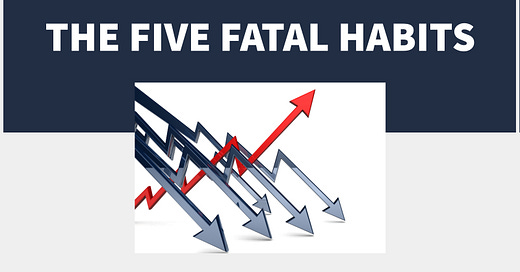The Five Fatal Habits
How mainstream "Big Con" consulting firms successfully stifle, smother and strangle organisational efforts to create future-fit cultures of innovation, agility, and adaptiveness
“The scale of contracts with the consulting industry — via roles as advisors, legitimators of controversial decisions and outsourcers — weakens our businesses, infantilizes our governments and warps our economies. The cumulative use of big consultancies that operate with extractive business models stunts innovation and capacity development, undermines democratic accountability and obfuscates the consequences of political and corporate actions. In the end, we all pay the price through the lack of in-house investment and learning: public funds and other resources are wasted, decisions in government and business are made with impunity and little transparency, and our democratic societies are deprived of their dynamism. The Big Con imperils us all.” — Mariana Mazzucato and Rosie Collington — “The Big Con” 1
To survive and thrive in an increasingly uncertain and unpredictable future, organisations must create cultures of innovation, agility, and adaptiveness whilst continuing to deliver on current commitments.
Innovation, agility, and adaptiveness cannot be bolted on to an existing organisation by creating an innovation lab, adding a digital platform, or hiring external agencies.
And while new technologies like AI will clearly have an impact, it’s the people in an organisation who ultimately make the difference – by experimenting, exploring, and exploiting new ways of creating new value as part of their everyday work.
The biggest challenge organisations face in becoming future fit is escaping from legacy cultural baggage that not only holds them back but acts like an immune system that actively protects and preserves the status quo whilst stifling, smothering and strangling innovation, agility, and adaptiveness.
Most attempts to create a future-fit culture fail due to this cultural baggage.
So, how can you ensure that your efforts succeed?
The single most important thing to understand is that cultural transformation only succeeds when it’s led, guided and delivered by people in the organisation themselves.
That’s why the vast majority of transformational change efforts fail — because they’re designed and delivered by mainstream “Big Con” consulting firms whose primary aim is to keep lots of their junior consultants billable on client fees. 2
Why would you expect your people to develop future-fit organisational muscles when busloads of outsiders are shipped in to do the heavy lifting?
If these large-scale consulting interventions actually worked, then you can be sure that the firms involved would be running around with their megaphones telling everyone about the amazing high profile success stories of transformational change they’ve guided and led.
However, despite mainstream management consulting having become a gargantuan trillion-dollar global industry, such success stories are conspicuous by their absence. 3
Instead, the Big Con outfits blame their own abject failure to help their clients create future-fit cultures on “employee resistance and lack of management support”. 4
My 22-page report on the cultural baggage preventing organisations from creating future-fit cultures highlights how this is systemically reinforced by mainstream management consulting firms in the form of Five Fatal Habits as follows:
Habit #1: “One Best Way” Thinking.
This is a legacy that stems from the principles of “Scientific Management” laid down more than a century ago. Overcoming this habit allows an organisation to leverage its own unique opportunities to achieve greater success with less effort and risk.
Habit #2: “All or Nothing” Thinking.
This is a legacy that stems from the Strategic Planning era of the 1960’s to 1990’s. Overcoming this habit enables more people to make pragmatic, low risk, high leverage, iterative contributions to organisational innovation, agility, and adaptiveness.
Habit #3: Leadership that Creates Followers.
This is a legacy that stems from traditional notions of what it means to be a leader. Overcoming this habit develops an organisation’s capacity for future-fit leadership
Habit #4: Wasting People’s Strengths.
This is a legacy that stems from traditional HR practices developed for a bygone era. Overcoming this habit unleashes the collective human capacity for innovation, agility, and adaptiveness.
Habit #5: Hired Help that Hinders.
This is a legacy that stems from more than a century of mainstream management consulting practice. Overcoming this habit lets you break free from the most systemically debilitating reinforcement to the other four fatal habits.
To download the recently updated 22-page Five Fatal Habits report, click here:
The Big Con: How the Consulting Industry Weakens our Businesses, Infantilizes our Governments and Warps our Economies, by Mariana Mazzucato and Rosie Collington ISBN-13 978-0593492673 (Quote from p9 of 344. Kindle locator 496 of 7360.)
For how management consulting ended up in this sorry state, see the earlier article How management consulting went rogue.
In 2023 the management consulting market hit a trillion dollars — that’s $1,000,000,000,000 — according to Statista.
Big Con brand leader McKinsey made this claim here, stating: “We know, for example, that 70 percent of change programs fail to achieve their goals, largely due to employee resistance and lack of management support”. Those of us who have been hired to help organisations recover from the mess such outfits leave behind see it differently: “We know, for example, that most change programs fail to achieve their goals, largely due to them being led by Big Con firms like McKinsey”.





